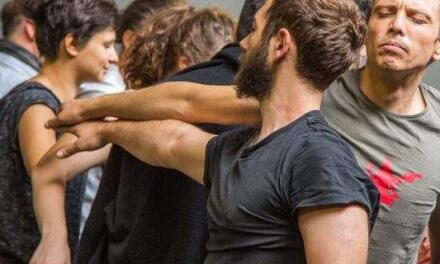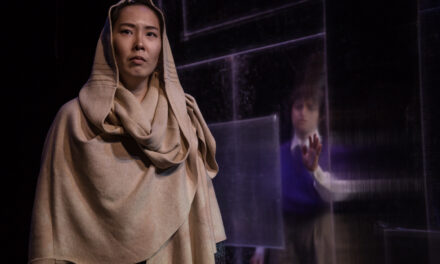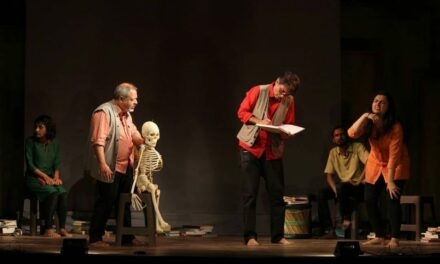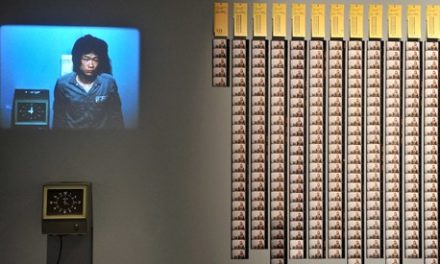A production from Compagnie L’Héliotrope, and co-presented by the Cultural Services of the French Embassy in the U.S. in New York and Abrons Arts Center with Jim Fletcher and Birgit Huppuch.
In the play, Pollock acclaimed French playwright Fabrice Melquiot highlights how it is impossible to fully understand the brilliance and madness of Jackson Pollock without studying his marriage to artist Lee Krasner.
Pollock translated into English by Kenneth Casler & Myriam Heard, and directed by Paul Desveaux, Compagnie L’Héliotrope, explores the charged empty space between Pollock—performed by Jim Fletcher—and Krasner—performed by Birgit Huppuch(*); between his genius and her spirit; between the inhibitions of the former and the frustrations of the latter.
The Cultural Services of the French Embassy and FACE Contemporary Theater Program aim to highlight the work of French playwrights—both in French and English translation—for a broad American audience. In recent years, greater attention has been devoted to developing productions of French plays translated into English staged with an American cast. Pollock is part of this momentum.
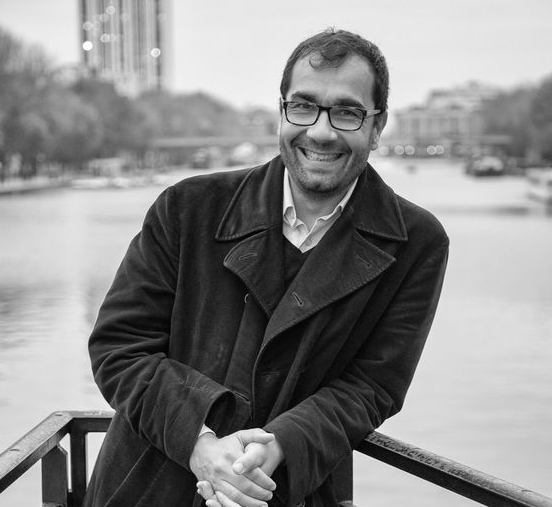
Paul Desveaux, Director of Compagnie L’héliotrope is back in New York to develop the production Pollock written by Fabrice Melquiot. The play opens on February 15 at Abrons Arts Center, two years after the first workshop with actors Birigit Huppuch and Jim Fletcher. Following the first interview in Fall 2015, Paul shared more about the play between two rehearsals.
Nicole: In 2015 you mentioned your fascination with the English version of the play Pollock and its rhythm. Tell us more about your attraction to Melquiot’s writings and how it works with the American actors?
Paul: Fabrice is what I call un écrivain-voyageur, a writer-traveler interested in authors from different places of the world, but before all, a poet. When I started to imagine a staged adaptation about American iconic artists, I looked for a poet and a writer capable of working and playing with the musicality of the words. For this American English language production translated by Miriam Heard and Kenneth Casler—and the two fabulous actors Birgit Huppuch and Jim Fletcher—the text will take us to another musical dimension, with different accentuations and intonations than in French. The effect offers a different way to breath–perhaps closer to Pollock and Krasner’s everyday life.
Nicole: Tell us more about the differences?
Paul: In French, the music in the sentences is more linear. In American English, in my opinion, the way to tell, to express the words, is more physical, maybe more carnal. In French, there is also some physicality in the words but there is more self-control (there is more restraint) than in American English. These are nuances I hear when I listen to recordings of Allan Ginsberg or Jack Kerouac, for example.
Fabrice’s writing is extremely musical with a pulse but no specific patterns or “open patterns,” it is like “vers libre,” free verse. Birgit and Jim are extremely attentive to the cadence of the text, even within a single sentence. During our first week of rehearsals, I was fascinated by the way they so quickly seized the tempo of the text to adapt it to the music that accompanies the play.
Nicole: The music? Tell us about the music.
Paul: There is a recorded music that goes with the play. It was composed by Vincent Artaud with musicians such as the saxophonist Pierrick Pedron for the first production in France in 2009. The composition is influenced by Be Bop, Hard Bop….
Nicole: Did the art itself of Jackson Pollock and Lee Krasner influence you? And if yes, how?
Paul: Thanks to Jackson Pollock’s painting and art, I discovered Carl Jung. It helped me in my own reflection on what the theater is in relation to the collective unconscious.
For example, how a text of a poet told by actors on stage stirs the audience with a common awareness. I pay attention to this moment.
Regarding Lee Krasner, she brought and shared thoughtful ideas with Clement Greenberg about contemporary art, about the artistic impulse that also had great influence on me.
Nicole: Why the title Pollock and not Krasner?
Paul: Well you should ask Fabrice first (smiles…). Birgit and Jim asked the same question. I think the first drafts of the play had the title Pollock-Krasner. The play pays homage to Lee Krasner. I cannot remember exactly why the title ended up as Pollock. Maybe it sounded better, and maybe the absence of Krasner in the title says a lot about her self-effacement, her modesty (and her love) towards Pollock.
Nicole: THANK YOU, Paul. See you at Abrons Arts Center very soon.
The production of Pollock is made possible by funds from the Cultural Services of the French Embassy in partnership with FACE Foundation; Abrons Arts Center, New York; Institut Français Paris; Le Tangram–Scène Nationale d’Evreux; and Compagnie L’Héliotrope. Compagnie La Vallée/L’Héliotrope is supported by the Ministry of Culture–DRAC Normandie, and Région Normandie.
Special thanks to Peregrine Whittlesey, Literary Agent
*This actress is appearing courtesy of Actors’ Equity Association
For more information, click here
This article originally appeared in two parts on French Culture in January, 2018. The original introduction can be viewed here and the interview can be viewed here. Both articles have been reposted with permission.
This post was written by the author in their personal capacity.The opinions expressed in this article are the author’s own and do not reflect the view of The Theatre Times, their staff or collaborators.
This post was written by Nicole Birmann Bloom.
The views expressed here belong to the author and do not necessarily reflect our views and opinions.


